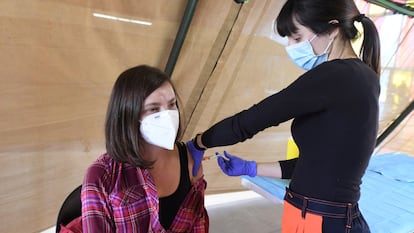In Spain, under-60s with one AstraZeneca dose may choose between two options for second shot
A bioethics committee supports having 1.5 million essential workers switch to Pfizer, but opens the door to continuing with the same treatment after signing a consent form

Around 1.5 million people under the age of 60 in Spain who received a dose of the vaccine made by Oxford-AstraZeneca may now choose whether they want a second dose from the same manufacturer or from Pfizer-BioNTech instead.
If they choose to continue with AstraZeneca, they will have to sign a consent form stating that they understand the potential risks associated with this vaccine, which has been tied to rare cases of blood clotting, mostly among people under 60.
Spain’s Bioethics Committee has greenlighted the possibility after the government asked it to issue an opinion on the matter. While the Public Health Committee, which represents central and regional health authorities, this week supported switching to Pfizer, some regional governments such as Madrid and Andalusia favored letting people continue with AstraZeneca.
Responsibility for the recommendation has been delegated to an ethics committee that was not up to the taskQuique Bassat, epidemiologist
Although in practice people will have a choice between both manufacturers, the Bioethics Committee preferred not to frame it as such, and insisted it opposes the concept of giving people the right to decide on this matter.
“The right to choose is not recommendable in this case and it is not recognized,” said Committee President Federico de Montalvo. “The correct decision, as agreed by the Public Health Committee, is a heterologous course of action with a second dose by Pfizer. But given the risk that a person could be left without a complete vaccination treatment, and considering what this means collectively and individually, if a person expresses rejection, then we recommend that they be offered a second dose of AstraZeneca.”
The Bioethics Committee is an advisory body and its decisions are not binding, but the Health Ministry wanted to hear its views because of the relevance of the matter. This will be the first time that citizens will, in practice, be able to select one of two vaccine manufacturers.
Regional authorities, which are in charge of the vaccine rollout, now face a more complex situation. “It will make logistics more complicated because it will force us to have enough reserves of both [vaccines] available at vaccination points,” said one regional official.
There are also many health professional who question the way the matter has been handled. Quique Bassat, an epidemiologist and researcher at the ISGlobal Institute in Barcelona, said he cannot understand why the consent form has to be signed by people wishing to continue with AstraZeneca – a course of action supported by the European Medicines Agency (EMA) – instead of those who want to switch to Pfizer.
“Responsibility for the recommendation has been delegated to an ethics committee that was not up to the task when it came to keeping a distance from an eminently political decision and really considering the available scientific evidence, as well as the ethical implications of accepting a vaccine combination that hasn’t been backed by any regulatory body,” he said.
Weeks in limbo
The question of what to do with 1.5 million essential workers who are waiting for their second doses had taken on urgency after the recommended waiting period between shots began to expire. In early April the government announced it was halting administration of AstraZeneca on under-60s due to reports of blood clots among some younger recipients. This left a large group of teachers, firefighters, police officers and some health workers without a date for a second dose.
The government then announced it was extending the waiting period between doses from 12 to 16 weeks while the Carlos III Health Institute conducted a trial on volunteers to assess the risks of combining two different vaccines. This decision was criticized by some members of the medical community and by several regional governments.
Vaccination with AstraZeneca first encountered a hurdle in March when administration was placed on hold in several countries while the EMA investigated a few reports of blood clots among recipients. The rollout was resumed, only to be altered again when the Spanish government decided to stop inoculating under-60s with this vaccine.
Authorities in Spain are hoping to have over 30 million people fully vaccinated before the end of August.
English version by Susana Urra.
Tu suscripción se está usando en otro dispositivo
¿Quieres añadir otro usuario a tu suscripción?
Si continúas leyendo en este dispositivo, no se podrá leer en el otro.
FlechaTu suscripción se está usando en otro dispositivo y solo puedes acceder a EL PAÍS desde un dispositivo a la vez.
Si quieres compartir tu cuenta, cambia tu suscripción a la modalidad Premium, así podrás añadir otro usuario. Cada uno accederá con su propia cuenta de email, lo que os permitirá personalizar vuestra experiencia en EL PAÍS.
¿Tienes una suscripción de empresa? Accede aquí para contratar más cuentas.
En el caso de no saber quién está usando tu cuenta, te recomendamos cambiar tu contraseña aquí.
Si decides continuar compartiendo tu cuenta, este mensaje se mostrará en tu dispositivo y en el de la otra persona que está usando tu cuenta de forma indefinida, afectando a tu experiencia de lectura. Puedes consultar aquí los términos y condiciones de la suscripción digital.









































